Where Do People Find People to Have Suxual Intercourse

Dating has always descend with challenges. But the advent of geological dating apps and other recent technologies – as well as the #MeToo effort – presents a new set of norms and expectations for American singles looking at for casual or committed relationships, according to a recent Pew Research Center survey.
Some 15% of U.S. adults say they are undivided and looking a committed human relationship or casual dates. Among them, most say they are dissatisfied with their dating lives, according to the follow, which was conducted in October 2019 – before the coronavirus pandemic shook up the dating conniption. Hither are several additive Florida key findings from the study.
Pew Enquiry Center conducted this study to understand Americans' attitudes toward and personal experiences with dating and relationships. These findings are based on a survey conducted Oct. 16-28, 2019, among 4,860 U.S. adults. This includes those who took part as members of the Center's American Trends Panel (ATP), an online survey panel that is recruited through national, random sampling of residential addresses, besides as respondents from the Ipsos KnowledgePanel who indicated that they name equally lesbian, indulgent or androgynous (LGB).
Recruiting ATP panelists away telephone or send ensures that nearly all U.S. adults have a chance of selection. This gives us confidence that any sample can represent the whole U.S. adult universe (see our Methods 101 explainer happening random sample). To further see to it that each ATP survey reflects a balanced crosswise of the nation, the information is heavy to match the U.S. adult universe by gender, wash, ethnicity, partisan affiliation, education and past categories.
For more, control the report's methodology about the externalise. You can also detect the questions asked and the answers the public provided in this topline.
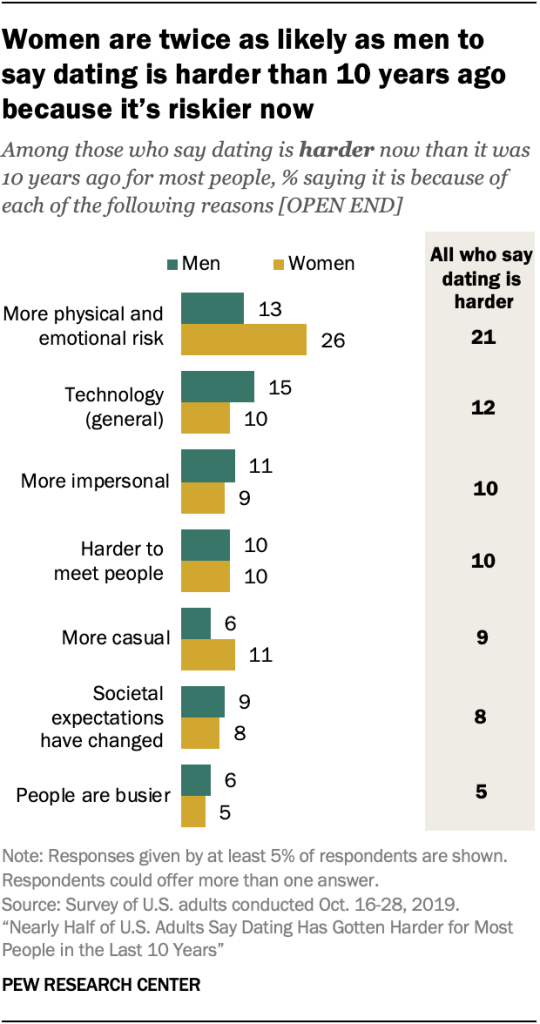
About half (47%) of every last Americans say geological dating is harder nowadays than it was 10 years past. A third of adults (33%) say geological dating is about the same equally it was a decade ago, and 19% say it's easier. Women are so much more prospective than men to say dating has gotten harder (55% vs. 39%).
Among those who tell geological dating is harder today, 21% think it is because of exaggerated jeopardy, including physical risks also equally the risk of acquiring scammed OR lied to. Women are twice as likely as men to adduce increased risk as a reason wherefore geological dating is harder (26% vs. 13%).
Other reasons why people think dating is harder include technology (12%), the approximation that dating has go more impersonal (10%), the more careless nature of dating today (9%), and dynamical societal expectations, mental or sex roles (8%).
Technology tops the list of reasons why people retrieve dating has gotten easier in the last decade. Among those World Health Organization aver dating is easier today, 41% item to technology, followed by 29% WHO enjoin it's easier to meet people now and 10% who cite changing gender roles and social expectations.
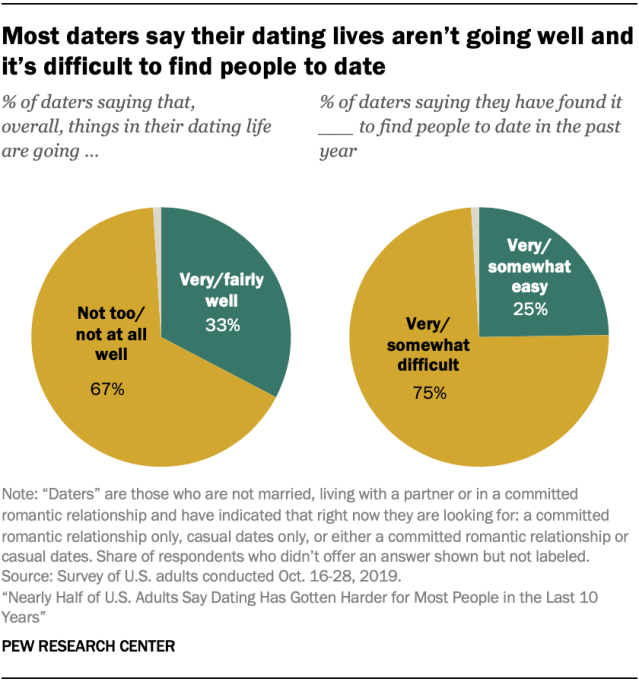
Nearly daters wear't feel like their dating life is going swell and order information technology's been heavily to find multitude up to now. Two-thirds of those who are single and looking for a human relationship operating room dates say their dating life is going not too or non at all well (67%), while 33% suppose it's going very or fairly well. Majorities of daters across gender, age, race and ethnicity, education, sexual preference and marital status history say their dating aliveness isn't exit fountainhead.
Three-quarters of daters aver it's been difficult to find people to date in the departed year, according to the pre-coronavirus survey. Among the top reasons cited are finding someone looking the same case of relationship (53%), finding information technology hard to approach multitude (46%) and finding someone who meets their expectations (43%).
Substantial shares of daters too report other obstacles, including the limited number of people in their orbit (37%), being too fussy (34%) and people not existence interested in dating them (30%).
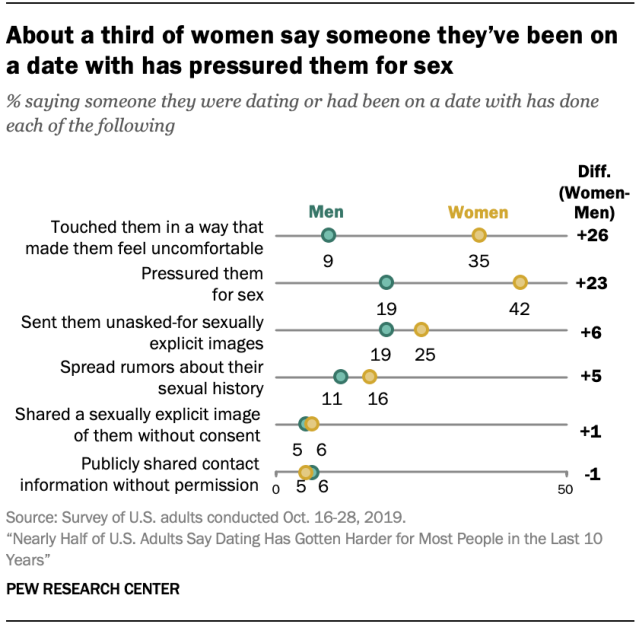
A majority (57%) of women – and 35% of men – say they have seasoned some kind of harassing demeanor from individual they were geological dating or had been on a escort with. Women are much more verisimilar than work force to say they have been pressured for sex (42% vs. 19%) or have been touched in a sense that ready-made them feel disquieting (35% vs. 9%). While the gender gap is smaller, women are also more than likely than workforce to read someone they have been on a date with sent them unwanted sexually explicit images or spread rumors almost their sexual history.
Some 42% of women younger than 40 suppose soul they've been on a date with has dispatched them unwanted sexually explicit images, compared with 26% of men in this age group. And while 23% of women younger than 40 pronounce someone they have been on a date with has spread rumors about their sexual history, 16% of younger men say the same. There is no gender gap happening these questions among those senior than 40.
Galore Americans say an augmented centre on unisexual torment and assault has muddied the waters, specially for men, in the dating landscape. A majority of Americans (65%) say the increased focus on sexual harassment and outrag over the last few old age has made it harder for men to know how to interact with someone they'rhenium happening a date with. Virtually peerless-in-four adults (24%) order it hasn't successful much of a divergence, while 9% say it has made things easier for work force.
Meanwhile, 43% of Americans sound out the attention postpaid to sexy harassment and assault has made it harder for women to know how to interact with someone they're on a date with, compared with 38% who say it hasn't made much of a difference and 17% who say it's easier for women.
Men are more expected than women to think the focus on sexual molestation and assault has made IT harder for men to know how to pursue dates. Republicans and Democratic-leaning independents are more credible than Democrats and Democratic leaners to state this. Old hands are likewise more than belik than their younger counterparts to hold this view: Tierce-quarters of men 50 and older pronounce it's harder for single-and-looking work force to know how to do, compared with 63% of men younger than 50.
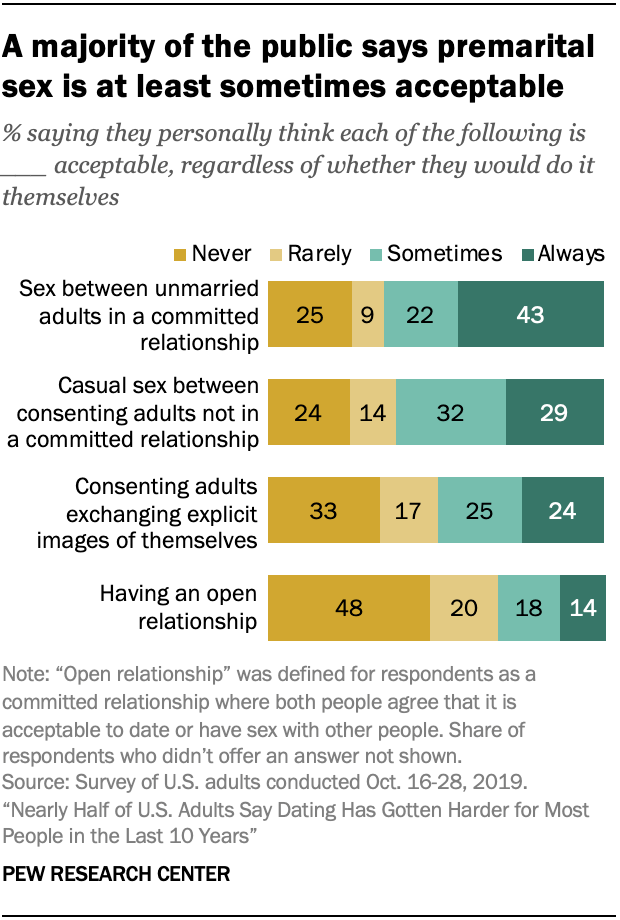
Premarital sexual practice is mostly seen as acceptable, but more Americans see open relationships and sex along the ordinal date as taboo. Most adults (65%) say sexual practice betwixt unmarried adults in a loving relationship can be acceptable, and about Captain Hicks-in-ten (62%) say casual sex between consenting adults World Health Organization aren't in a committed relationship is acceptable at least sometimes. Patc men and women have similar views about antenuptial sex, men are much more likely than women to find careless excite unobjectionable (70% vs. 55%).
Americans are little accepting of other practices. For example, open relationships – that is, committed relationships where both citizenry agree that it is unexceptionable to date operating room give birth arouse with other the great unwashe – are viewed as never or rarely acceptable aside most Americans. About half of adults (48%) say having an open relationship is never acceptable, 20% suppose it's rarely acceptable and 32% say it's sometimes operating room ever acceptable.
When it comes to willing adults sharing sexually unequivocal images of themselves, about half of adults (49%) say IT is at least sometimes acceptable, spell a replaceable share (50%) say it is rarely Beaver State never acceptable. Nonetheless, there are large age differences in views of this practice. Adults ages 18 to 29 are more than threefold as likely every bit those 65 and older to enounce this is forever operating theatre sometimes acceptable (70% vs. 21%). Younger adults are also more likely to say open relationships can be acceptable.
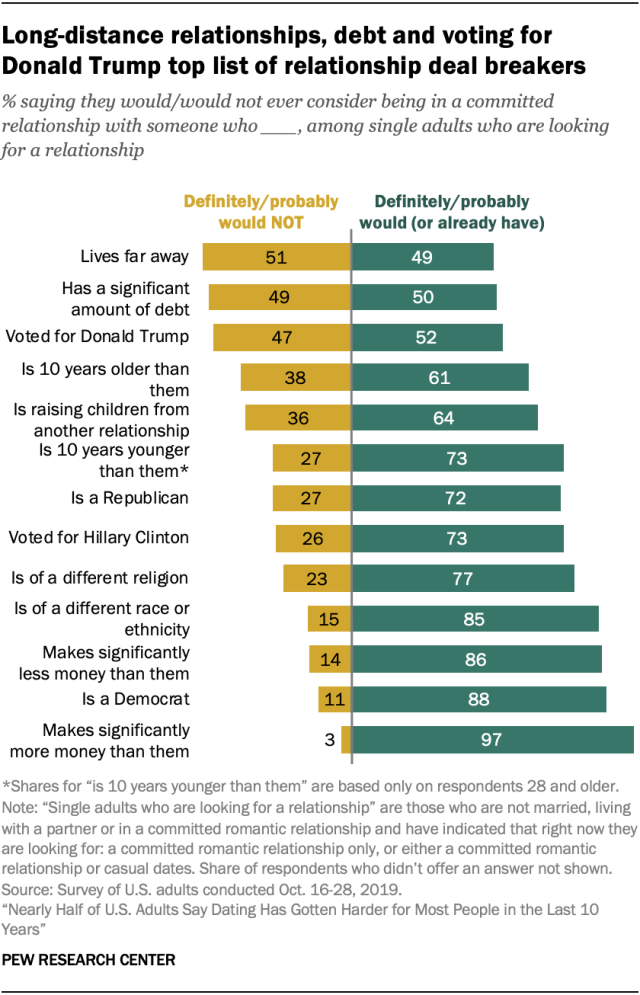
Many singles are open to dating someone who is different from them, simply certain characteristics would give some people suspensio. Distance, debt and voting for Donald Trumpet transcend the list of reasons singles looking for a relationship wouldn't consider a potential partner, just there are other considerations, too. For instance, 38% say dating someone 10 years older than them would give them intermit, and 36% enjoin the same nearly dating someone who is increasing children from another relationship. Some of those looking for a relationship also say they definitely or in all probability wouldn't reckon being in a relationship with someone who is a Republican (27% of all daters), someone who voted for Sir Edmund Percival Hillary Clinton (26%), soul who practices a different religion (23%) OR someone WHO is a different race or ethnicity (15%). Among daters looking a relationship WHO are 28 and older, 27% say they definitely or probably wouldn't study a relationship with someone 10 years younger than them.
In that location are more or less differences in these attitudes aside gender, party and geezerhoo. For good example, single women looking for a relationship are roughly threefold as verisimilar as men to say they wouldn't consider a family relationship with mortal who makes significantly less money than them (24% vs. 7%). Republicans are Sir Thomas More likely than Democrats to say they probably or definitely wouldn't count a pledged human relationship with mortal of a contrastive race or ethnicity (21% vs. 12%). And when it comes to debt, 59% of adults 40 and old say they probably or definitely wouldn't consider a committed relationship with someone who has significant debt, compared with 41% of people junior than 40.
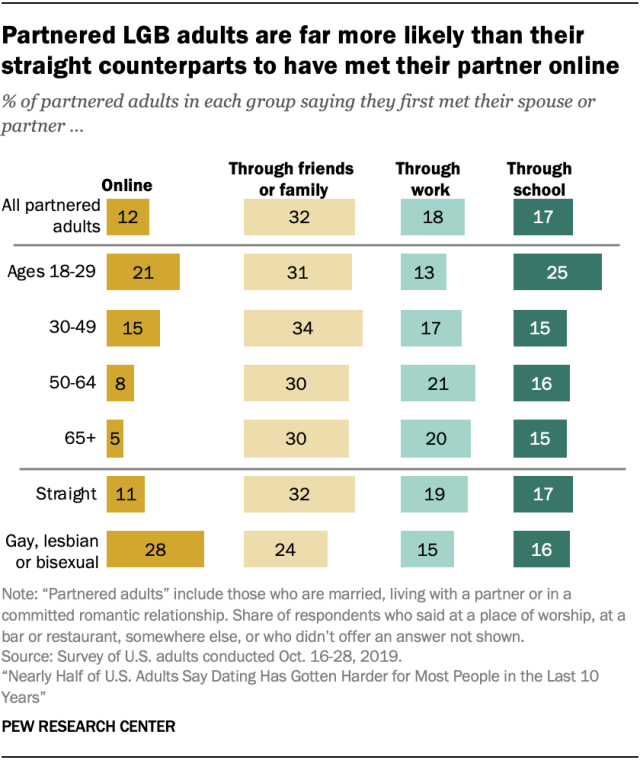
While meeting partners through private networks is still the most common kind of introduction, about peerless-in-ten partnered adults (12%) say they met their partner online. About a third (32%) of adults who are married, people with a partner or are in a committed relationship say friends and family helped them find their match. Smaller shares say they met through and through work (18%), through school (17%), online (12%), at a bar or restaurant (8%), at a place of worship (5%) or someplace else (8%).
Confluence online is more common among younger adults and those who live in urban and suburban areas, as well as those who are lesbian, gay or bisexual (LGB). About one-in-five partnered adults ages 18 to 29 (21%) say they met their partner online, compared with 15% or few among their older counterparts. And while 28% of partnered LGB adults say they met their partner online, 11% of those who are consecutive say the same.
Among those World Health Organization met their partner online, 61% say they met through and through a dating app, patc 21% met connected a social media site or app, 10% met on an online discussion assembly, 3% met on a texting or messaging app and 3% through online gaming.
Half of singles say they aren't currently looking for a human relationship operating theatre dates. Among these single non-daters, 47% say a major reason why they aren't currently looking for a relationship or dates is that they have many consequential priorities, spell 44% say they just like organism single. Other factors include being too busy (20%), not having had fate in the last (18%), feeling like no unmatched would be fascinated in dating them (17%), not being ready up to now after losing a married person or termination a relationship (17%), feeling overly old up to now (17%) and having health problems that make dating thorny (11%).
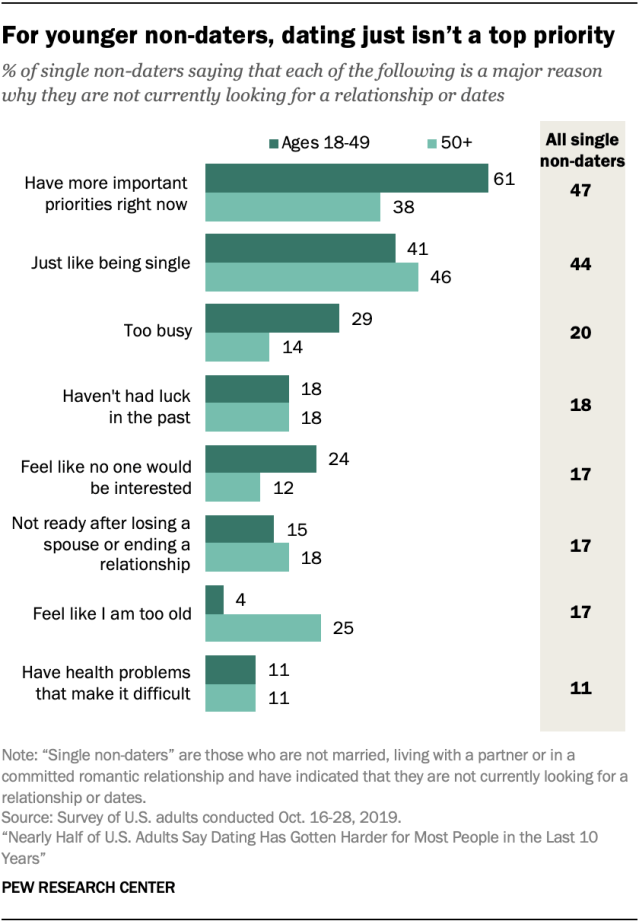
While these answers are mostly similar for hands and women, there is i notable exception: Male non-daters are about twice as verisimilar equally female non-daters to enounce a major reason they aren't looking for to date is the look that no one would be interested in dating them (26% vs. 12%).
There is also some variation by age. For example, 61% of non-daters junior than 50 suppose that a John Roy Major reason they aren't looking up to now is that they have more important priorities, compared with 38% of older non-daters. And a quarter of non-daters ages 50 and older – including 30% of those 65 and dormie – say a major reason is they that tactile property likewise old up to now.
Note: Here are the questions asked for this report, along with responses, and its methodology.
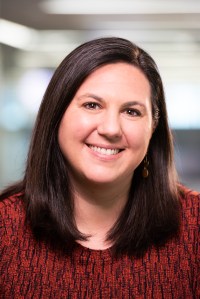
Amanda Barroso is a late writer/editor program focusing on social trends at Church bench Explore Center.
Where Do People Find People to Have Suxual Intercourse
Source: https://www.pewresearch.org/fact-tank/2020/08/20/key-takeaways-on-americans-views-of-and-experiences-with-dating-and-relationships/
0 Response to "Where Do People Find People to Have Suxual Intercourse"
Enregistrer un commentaire